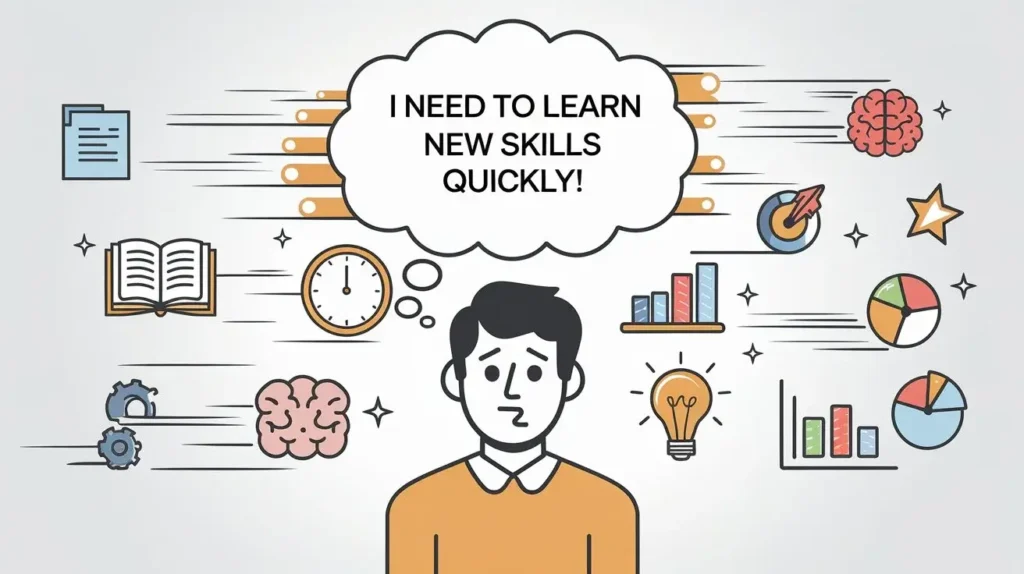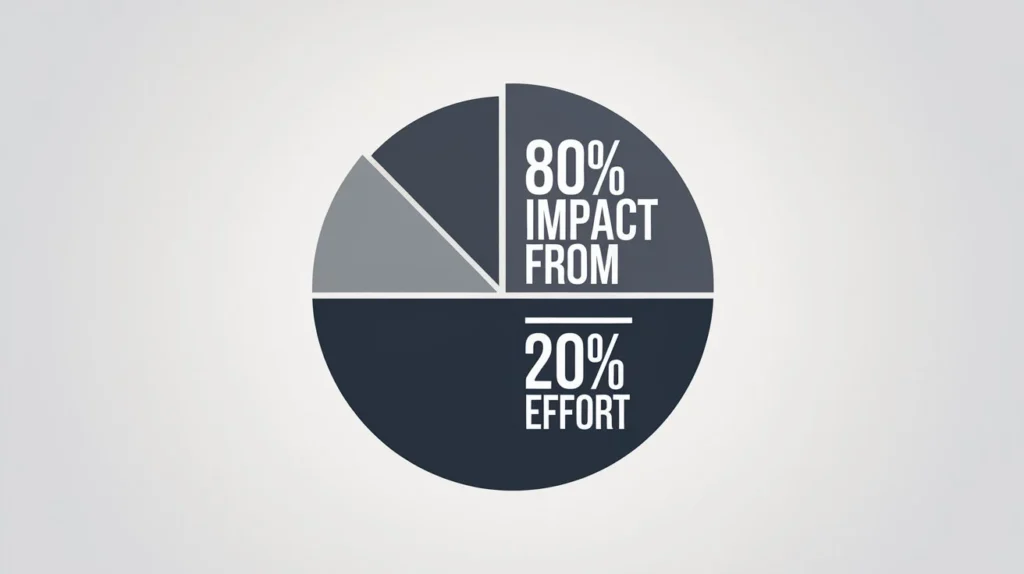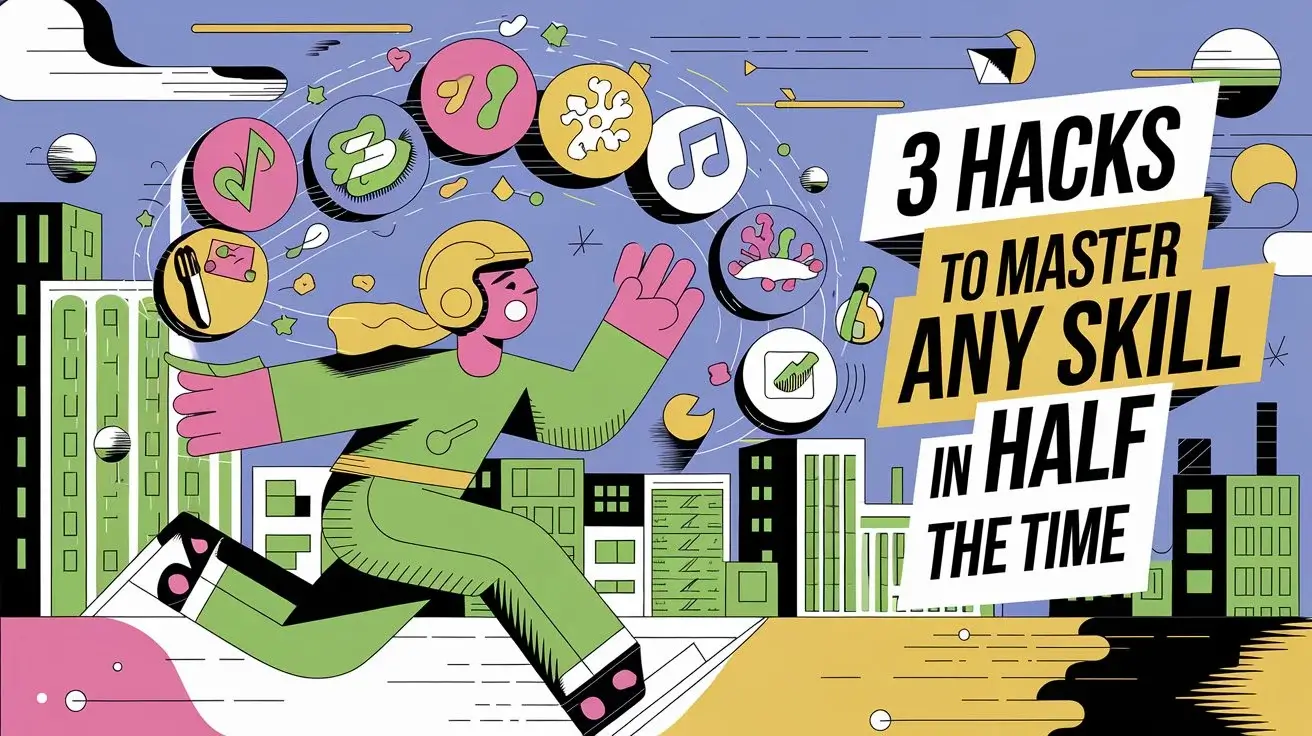Introduction
Master Any Skill in Half the Time: In today’s fast-paced world, learning new skills quickly and effectively is more important than ever. Whether you want to master a new language, become a coding expert, or improve your public speaking, the ability to learn fast can give you a major advantage. The world is evolving at lightning speed, and those who adapt quickly stay ahead.
But let’s be honest—learning something new often feels frustrating. Have you ever started learning a skill, only to lose motivation because it felt too difficult or took too long? You’re not alone. Many people struggle with slow progress, information overload, and lack of proper techniques.

So, why does it take so long to master a skill?
- Lack of Focus – Jumping from one skill to another without a structured plan.
- Passive Learning – Reading about a skill instead of actively practicing it
- Wrong Learning Techniques – Spending too much time on things that don’t improve real-world performance.
The good news? There are proven methods to accelerate learning, and you don’t need to be a genius to apply them. In this article, you’ll discover 3 powerful hacks that will help you cut your learning time in half. These techniques are used by top professionals, athletes, and successful entrepreneurs to master skills faster and more efficiently.
So, if you’ve ever wanted to learn smarter, not harder, you’re in the right place. Let’s dive into the 3 hacks that can transform the way you learn! 🚀
Hack #1: Learn by Doing (Practice More, Read Less)

Ever read five books on cooking but still burn scrambled eggs? The fastest way to master any skill isn’t passive learning—it’s getting your hands dirty.
Why Practice Beats Theory
Reading about a skill feels productive, but it’s like watching someone ride a bike while never pedaling yourself. Your brain retains 75% more information when you actively use it (hello, neural pathways!). For example:
- Guitar learners who practice chords daily outperform those who binge-watch tutorials.
- Coders who build small projects grasp concepts faster than textbook readers.
The Science Behind “Learn by Doing”
When you do something—like strumming a guitar or debugging code—your brain strengthens muscle memory and problem-solving networks. It’s survival mode: your mind prioritizes what you use, not what you memorize.
Your Action Plan: The Learn-Do-Reflect Cycle
- Learn (10%): Watch one short tutorial or read a chapter.
- Do (80%): Apply it immediately—write code, cook a meal, play a song.
- Reflect (10%): Ask, “What worked? What needs tweaking?”
Real-world example: Want to learn Spanish? Skip the grammar marathon. Chat with a native speaker for 5 minutes daily. Mistakes? They’re proof you’re evolving.
Stop Preparing. Start Doing.
Reading has its place, but progress lives in action. Set a 20-minute daily practice rule. Track small wins. Watch skills stick.
Ready to stop thinking about goals and start achieving them? Hack #2 is next—it’s all about doubling your learning speed. Stay tuned.
Hack #2: Use the 80/20 Rule (Focus on Key Concepts)

The 80/20 Rule, also known as the Pareto Principle, states that 80% of your results often come from just 20% of your efforts. When applied to learning, this means you should focus on the small set of high-impact activities that drive the majority of your progress.
Why the 80/20 Rule Works
- Saves Time – By identifying what truly matters, you spend less time on low-impact tasks.
- Maximizes Efficiency – You see quick wins, which keeps you motivated and speeds up your learning.
- Reduces Overwhelm – Instead of trying to do everything, you concentrate on what moves the needle the most.
Real-World Example
If you’re trying to master a new language, don’t waste time memorizing every word in the dictionary. Focus on the 500 most common words and essential grammar rules first. This approach will allow you to start speaking and understanding conversations faster, giving you an early confidence boost.
How to Apply the 80/20 Rule
- Identify the High-Value Skills – Ask yourself: “Which specific tasks or topics bring the biggest results?”
- Streamline Your Study – Spend most of your time on these key areas. For instance, if you’re learning guitar, master the basic chords that appear in the majority of songs.
- Track Your Progress – Regularly check if you’re improving in the areas you’ve prioritized. Adjust your focus if needed.
By zeroing in on the most important concepts, you’ll master any skill in half the time and avoid feeling stuck in unnecessary details.
Hack #3: Teach What You Learn (Feynman Technique)

If you really want to master any skill, don’t just study it—teach it. This method, inspired by physicist Richard Feynman, uses simple explanations to uncover gaps in your knowledge. By breaking complex ideas into smaller, understandable parts, you force your brain to process information more deeply.
Why Teaching Boosts Learning
- Creates Clarity – When you teach, you have to simplify the topic. This reveals what you truly understand and where you’re still confused.
- Improves Retention – Studies show that explaining concepts to others helps you remember them longer.
- Builds Confidence – Sharing knowledge makes you more comfortable with the material, reinforcing your skills.
Real-World Example
Imagine you’re trying to learn a programming language. You might watch tutorials or read documentation, but you still feel uncertain. Now, try explaining the main concepts to a friend who knows nothing about coding. You’ll quickly see if you can translate technical terms into simple, everyday language. If you get stuck, that’s a sign you need to review those points.
Actionable Tips
- Start a Blog or YouTube Channel – Create simple tutorials or write short articles about what you’re learning. This helps you organize your thoughts and stay motivated.
- Teach a Friend – Even if they don’t need the skill you’re learning, explaining it out loud can highlight knowledge gaps.
- Talk to Yourself – If you can’t find a friend or aren’t ready to go public, just speak your explanation out loud or record it on your phone.
By teaching what you learn, you’ll transform your own understanding, making it easier to grasp tough concepts and master any skill in half the time.
Bonus Tip: Take Smart Breaks

Learning a new skill doesn’t mean you should be pushing yourself non-stop. In fact, taking smart breaks can often be the difference between steady progress and total burnout. When you pause, you give your mind a chance to absorb and organize what you’ve learned, making it easier to recall later.
Why Rest Improves Memory and Avoids Burnout
- Memory Consolidation – Your brain needs downtime to process new information. Short, regular breaks help cement what you learn into your long-term memory.
- Stress Reduction – Overworking leads to mental fatigue, which slows down your ability to learn. Small breaks refresh your focus and keep you motivated.
Use Methods Like the Pomodoro Technique
25 Minutes Work, 5 Minutes Break – This simple method helps you stay focused for a short burst, then rewards you with a quick rest.
Prevent Overload – By sticking to these intervals, you avoid burnout and stay energized for the next round of learning.
The Role of Sleep in Strengthening Skills
- Deep Rest – Getting enough sleep isn’t just about recharging your body; it’s crucial for solidifying new skills in your brain.
- Better Retention – During sleep, your mind replays and organizes the day’s lessons, making it easier to remember them the next day.
By adding smart breaks into your routine—whether it’s a short walk, a quick meditation, or the Pomodoro Technique—you’ll protect your energy, improve your memory, and master any skill without feeling overwhelmed.
Conclusion

You’ve now learned 3 key hacks that can help you master any skill in half the time:
- Hack #1: Learn by Doing (Practice More, Read Less) – Dive into hands-on practice right away. The more you apply your knowledge, the faster you improve.
- Hack #2: Use the 80/20 Rule (Focus on Key Concepts) – Pinpoint the most important areas first. This approach gives you quick wins and maximizes your results.
- Hack #3: Teach What You Learn (Feynman Technique) – Explaining a topic to someone else (or even yourself) uncovers gaps in understanding and strengthens your memory.
Remember, consistency is the real game-changer. Even small steps each day add up to significant progress over time. Whether it’s practicing chords on the guitar for 15 minutes or reviewing a few vocabulary words daily, sticking with it is what truly makes a difference.
Finally, don’t forget the power of smart breaks. Allowing your brain to rest keeps you fresh, motivated, and ready to learn more.
Learning fast is absolutely possible—as long as you use the right strategies and stay committed to your goals!
